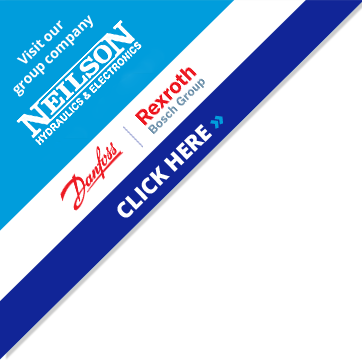Hydraulic systems are the backbone of countless industrial and mobile applications, providing unmatched power and precision in fields ranging from manufacturing to construction. However, even the most robust hydraulic components can fail, leading to costly downtime, reduced efficiency, and extensive repairs. Understanding the common causes of failure and implementing preventative measures can significantly extend the life of your hydraulic components. In this blog, we’ll cover some of the most frequent hydraulic component failures and offer insights on how to avoid them.
1. Hydraulic Pump Failures
Common Causes:
Contamination: The presence of dirt, metal particles, or other debris in hydraulic fluid can quickly damage a pump’s internal components, causing premature wear and eventual failure.
Cavitation: When air enters the hydraulic fluid, it can cause a drop in pressure, leading to cavitation. This results in the formation of vapor bubbles, which collapse and create shockwaves that damage the pump's internal surfaces.
Overheating: Running a hydraulic system at temperatures above the manufacturer’s recommendations can degrade the oil and cause metal components to warp or break under stress.
Prevention Tips:
Proper Filtration: Use high-quality filters and replace them regularly to keep contaminants out of the hydraulic fluid.
Correct Sizing and Installation: Ensure pumps are appropriately sized for the system's requirements, and that air does not enter the fluid through leaks or poor connections.
Temperature Control: Monitor system temperatures and ensure adequate cooling mechanisms are in place to avoid overheating.
2. Hydraulic Hose Failures
Common Causes:
Abrasion and Wear: Hoses are prone to external wear when they rub against other components or surfaces. Over time, this weakens the outer cover and exposes the reinforcement layers.
Improper Routing: Hoses that are too short, too long, or poorly routed are susceptible to bending, twisting, or kinking. This puts excessive strain on the hose and can lead to rupture or leaks.
Incorrect Pressure Ratings: Using a hose that isn’t rated for the system's pressure can lead to bursts or fatigue cracks.
Prevention Tips:
Use Hose Sleeves and Protectors: Install abrasion-resistant sleeves or spiral wrap to protect hoses from wear.
Proper Routing and Clamping: Ensure hoses have enough slack to avoid bending and that they are secured properly using hose clamps to prevent excessive movement.
Select the Right Hose: Always use hoses that meet or exceed the system's pressure and temperature requirements.
3. Cylinder Failures
Common Causes:
Seal Failure: Hydraulic cylinder seals are prone to wear over time, especially when exposed to contaminants or excessive heat. Worn seals lead to internal or external leaks, reducing cylinder performance.
Rod Damage: Scratches, dents, or bends in the cylinder rod can cause premature seal wear and hinder smooth operation. These imperfections are often caused by improper handling or external impacts.
Misalignment: Cylinders that are not properly aligned with their load or mounting points can experience uneven wear, leading to mechanical binding or failure.
Prevention Tips:
Use High-Quality Seals: Invest in seals made from durable materials suitable for your system's operating conditions, and inspect them regularly for signs of wear.
Protect Cylinder Rods: Use rod wipers or boots to keep contaminants away from the rod surface, and handle cylinders carefully during installation and maintenance.
Ensure Proper Alignment: Check that the cylinder is installed in alignment with its load and mounting points to prevent side loading, which can cause premature wear.
4. Valve Failures
Common Causes:
Contaminated Fluid: Dirt, metal shavings, or other contaminants can block small passageways in valves, leading to erratic operation or complete failure.
Improper Adjustment: Valves that are not adjusted to the system's specifications may result in poor flow control or pressure regulation, causing stress on other components.
Corrosion: Valves exposed to moisture, harsh chemicals, or other corrosive environments can experience internal corrosion, leading to sticking, leakage, or operational issues.
Prevention Tips:
Maintain Clean Fluid: Regularly change hydraulic fluid and replace filters to ensure the system remains free of contaminants.
Correct Adjustment: Set valve pressures and flow rates according to manufacturer guidelines to avoid excess stress on system components.
Material Selection: Choose valves made from corrosion-resistant materials if the system operates in a harsh environment, and ensure proper sealing to prevent moisture ingress.
5. Hydraulic Fluid Degradation
Common Causes:
Thermal Degradation: Hydraulic fluid can break down when exposed to excessive heat, leading to a loss of lubricating properties and formation of harmful byproducts.
Water Contamination: Moisture can enter the system through leaks, condensation, or improper storage, leading to fluid emulsification and rust.
Oxidation: Over time, hydraulic oil can oxidize, especially if exposed to high temperatures and air. Oxidation forms sludge and varnish, which can clog filters and damage components.
Prevention Tips:
Monitor Fluid Condition: Regularly test the fluid’s condition and replace it when necessary to avoid performance degradation.
Maintain Optimal Temperatures: Ensure the system's cooling mechanisms are functioning properly to keep the hydraulic fluid within the recommended temperature range.
Seal the System: Check seals, fittings, and reservoirs for leaks to prevent water ingress and air contamination.
Final Thoughts
The key to avoiding hydraulic component failures lies in proactive maintenance, proper system design, and attention to detail in the selection and use of components. By understanding the common causes of failure and implementing these preventative measures, you can extend the life of your hydraulic system, reduce downtime, and improve overall performance. At VHS Hydraulic Components, we offer expert advice, top-quality products, and tailored solutions to keep your hydraulic systems running smoothly. Contact us today to learn more about how we can support your hydraulic needs.
To enquire about all your hydraulic requirements, please contact VHS Hydraulic Components on: 0114 276 4430 / E: info@hydraulic-components.net or visit our website at: https://www.hydraulic-components.net/





 No Minimum Order
No Minimum Order














